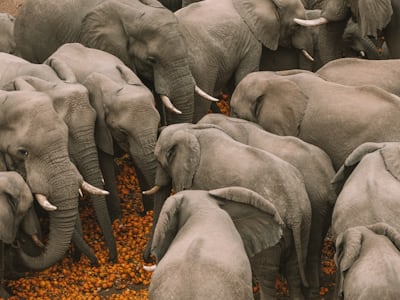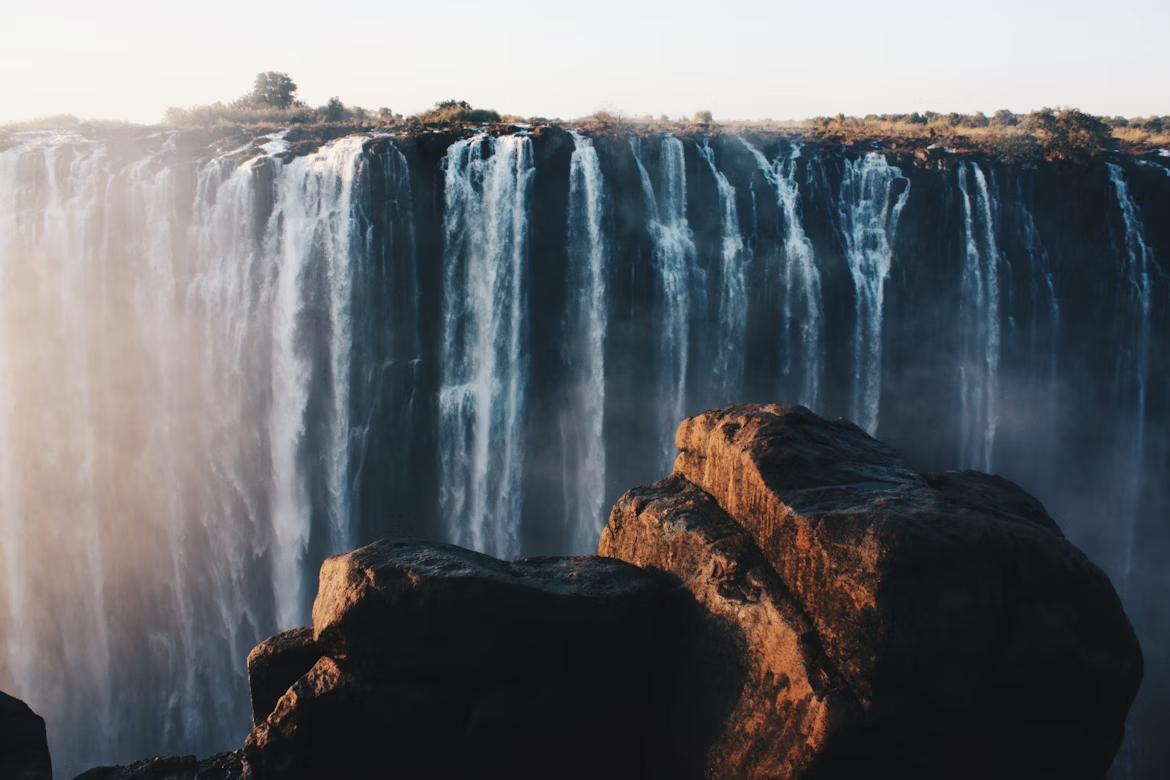Top Attractions
Zimbabwe is renowned for its natural wonders, most famously the awe-inspiring Victoria Falls. Known locally as Mosi-oa-Tunya, or "The Smoke That Thunders," this UNESCO World Heritage Site offers breathtaking views and adrenaline-pumping activities such as white-water rafting and helicopter flights. Hwange National Park is Zimbabwe’s largest wildlife reserve and home to a remarkable population of elephants, as well as lions, cheetahs, and hundreds of bird species. Matobo Hills, another UNESCO-listed site, presents a dramatic landscape of balancing granite boulders and ancient cave paintings. For historical intrigue, the ruins of Great Zimbabwe showcase the architectural achievements of an ancient African civilization and stand as the largest stone structure south of the Sahara. Lake Kariba provides both relaxation and water-based adventure, with houseboat tours offering a unique way to experience its expansive waters and surrounding wildlife.
Local Dishes
Zimbabwean cuisine is hearty and centered around staple ingredients like maize, meats, and leafy greens. Sadza, a thick porridge made from maize meal, is the cornerstone of most meals and typically served with a stew or relish. A popular accompaniment is muriwo unedovi, which consists of collard greens cooked with a rich peanut butter sauce. For meat lovers, nyama (grilled or stewed meat) is commonly enjoyed, often using beef, chicken, or goat. Matemba, or dried kapenta fish, is another beloved delicacy, especially when paired with tomatoes and onions. On the sweeter side, one might encounter sweet potato fritters or maheu, a fermented maize drink that is both nourishing and refreshing.
Transportation Tips
Navigating Zimbabwe can be an adventure in itself. For intercity travel, long-distance buses connect major towns and are generally affordable, though they may not adhere to strict schedules. Minibuses operate in cities like Harare and Bulawayo, but they tend to be overcrowded and lack formal stops, so first-time travelers might find them confusing. Renting a car is a good option for those wanting to explore more remote areas, especially national parks, though road conditions can vary and a 4x4 is advisable. Taxis are widely available in cities but often do not use meters, so it's important to agree on a price before starting the ride. Ride-hailing services are not yet widespread, but hotel-arranged transportation tends to be reliable. Be sure to have cash on hand, as card payments are not always accepted for transport.
Budget Travel Tips
Zimbabwe can be a relatively budget-friendly destination with some planning. To save on accommodation, consider staying in guesthouses or backpacker lodges, especially in towns like Victoria Falls, Bulawayo, and Harare. Many national parks offer campsites, which are both affordable and immersive. Meals from local eateries known as "takeaways" are inexpensive and give a taste of authentic Zimbabwean cuisine. Public minibuses are the cheapest way to get around, though they may not be the most comfortable. When visiting attractions like Victoria Falls, opt for park entrance only instead of bundled tour packages to save money. Traveling in a group can also reduce costs by sharing transportation and lodging. Exchanging currency at official forex bureaus typically yields better rates than hotels or banks.
Safety Info
Zimbabwe is generally safe for tourists, but awareness and preparation are key. Political demonstrations can occur without warning and should be avoided, especially in urban areas. Petty crime such as pickpocketing and bag snatching can happen in crowded markets or transport hubs, so keep valuables secure and use hotel safes when possible. Nighttime travel is not recommended, especially outside of major cities, due to poor road conditions and limited lighting. Wildlife encounters in national parks should be treated with respect; always follow your guide’s instructions. Tap water is not consistently safe to drink, so stick to bottled or filtered water. It's also important to have comprehensive travel insurance that covers medical evacuation, as health services outside of major cities are limited.
Cultural Etiquette
Zimbabweans are warm and courteous, and showing respect is very important. Greeting people with a handshake and a smile is customary, and elders should be acknowledged first. Dress modestly, particularly in rural areas and during visits to cultural or religious sites. Public displays of affection are best kept minimal. It’s polite to ask before taking photographs of individuals or their property. Visitors should avoid political discussions or criticism of the government in public, as this can be sensitive. When invited to someone’s home, it is customary to bring a small gift or offer to help with meal preparation. Learning a few phrases in Shona or Ndebele—the two most widely spoken languages—can go a long way in earning goodwill.
Travel Style Fit
Zimbabwe is a fantastic destination for adventure travelers, wildlife lovers, and culturally curious explorers. It’s perfect for those seeking authentic, nature-rich experiences and a less commercialized tourism scene. Budget travelers can get by with careful planning and enjoy the country’s natural beauty at low cost, while mid-range and luxury travelers will find excellent value in safari lodges and exclusive experiences. Solo travelers will find friendly locals and communal accommodations, while couples and families can enjoy diverse itineraries combining culture, wildlife, and relaxation. Whether you're in search of epic landscapes, untamed wilderness, or meaningful cultural exchanges, Zimbabwe delivers a travel experience that is raw, rewarding, and unforgettable.

Best Time to Visit
The best time to visit Zimbabwe is during the dry season from May to October. This period offers cooler temperatures and clear skies, making it ideal for wildlife viewing in national parks as animals congregate around water sources. June to August provides the most comfortable weather, while September and October see rising temperatures but excellent safari conditions. Victoria Falls is most impressive from February to May when water levels are highest, although the heavy spray can sometimes obscure views. The rainy season, from November to March, brings lush landscapes and fewer tourists, but some remote areas may become inaccessible due to muddy roads and swollen rivers.
Accommodation Recommendations
For low-budget travelers, accommodation options include simple guesthouses and backpacker hostels like Shoestrings Backpackers Lodge in Victoria Falls, which offers dorms and a lively social atmosphere, or Burkes’ Paradise in Bulawayo, known for its relaxed vibe and communal kitchen. These choices are affordable, centrally located, and often include helpful local insights for budget-friendly activities.
Mid-range travelers might enjoy staying at places like Cresta Sprayview Hotel in Victoria Falls or The N1 Hotel in Harare. These properties offer comfortable rooms, reliable amenities, and on-site dining while maintaining reasonable pricing. Many are conveniently located near key attractions or transportation hubs.
For luxury travelers, Zimbabwe offers exquisite accommodations such as Matetsi Victoria Falls, a five-star lodge set along the Zambezi River offering private pools, gourmet dining, and exclusive safari access. Another standout is Singita Pamushana Lodge in the Malilangwe Wildlife Reserve, known for its luxurious suites and conservation-focused safari experiences.
Languages Spoken
Zimbabwe has 16 official languages, but the most widely spoken are Shona and Ndebele. English is also an official language and is commonly used in business, government, and tourism. Travelers will find that most signage and official communication are in English, and those in the hospitality industry generally speak it fluently.
Currency
Zimbabwe uses a combination of the Zimbabwean dollar and foreign currencies, especially the US dollar, which is widely accepted. The economy has undergone significant currency fluctuations in recent years, so travelers should check current exchange practices before arrival. It’s advisable to carry small denominations of USD, as change may not always be available. Card usage is limited, especially outside major hotels or supermarkets, so cash remains the most reliable means of payment.
Common Traveler Mistakes to Avoid
One common mistake is underestimating travel distances and road conditions, especially when venturing into national parks or rural areas. Many travelers assume that Victoria Falls and Hwange are close enough to do in a single day without realizing the distances involved. Others overlook the need for travel insurance that includes emergency medical evacuation, which is essential in areas where medical facilities are limited. Failing to carry enough cash is another pitfall, as ATMs can be unreliable or cashless, and card acceptance is inconsistent. Some travelers also forget to check visa requirements or make assumptions about entry rules, which can result in border delays. Finally, ignoring local advice about safety, especially regarding nighttime travel or political gatherings, can lead to avoidable risks.
Essential Apps & Tools
Maps.me or Google Maps (with offline capabilities) are vital for navigating areas with limited signage or poor cell reception. Ecocash is a local mobile money app, though its use varies; US dollars are still more reliable. WhatsApp is the most popular messaging app in Zimbabwe and is often used for communication with tour operators and accommodation providers. XE Currency helps with real-time exchange rates, especially when navigating multiple currencies. For safari planning and wildlife tracking, the African Parks app or Safari Guide Africa can be helpful. Booking.com or Airbnb can be used for lodging options in urban centers and near major attractions.
Suggested Itinerary Styles
A one-week itinerary could begin with two nights in Victoria Falls to experience the falls, explore the rainforest trails, and try activities like zip-lining or a sunset Zambezi River cruise. From there, transfer to Hwange National Park for a two-day safari, enjoying game drives and staying at a private lodge or camp. Next, spend a night at Lake Kariba, either on a houseboat or in a lakeside lodge for some scenic relaxation. Conclude with two nights in Harare or Bulawayo to soak in Zimbabwean urban life, visit museums, and explore local markets before your departure.
Fun Facts
Zimbabwe is home to the world’s largest man-made lake, Lake Kariba, which stretches over 220 kilometers along the Zambia border and supports a thriving houseboat tourism industry. The country’s name is derived from the Great Zimbabwe ruins, once the capital of a powerful medieval kingdom, showcasing impressive stonework that predates European colonization. Victoria Falls is considered one of the Seven Natural Wonders of the World and creates a thunderous roar that can be heard from miles away. Zimbabwe also boasts the second-largest population of elephants in Africa, with herds often spotted in Hwange National Park. The country's flag colors symbolize key elements of national pride: green for agriculture, yellow for minerals, red for the blood shed during liberation, and black for the people.
